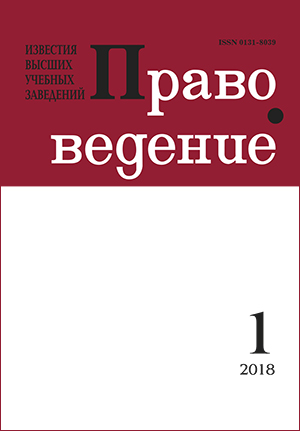Lawyers and revolution: legal ethos in the history of the Juridical Council in 1917
DOI:
https://doi.org/10.21638/11701/spbu25.2018.106Abstract
The following article considers the history of the Juridical Council of the Provisional Government from a biographical methodological perspective. The Juridical Council was established in March 1917 after the February Revolution in the system of the Provisional Government as a governmental body of legal expertise. The paper provides a summary of biographical information about lawyers of the Juridical Council (Vasily Maklakov, Fyodor Kokoshkin, Nikolay Lazarevsky, Vladimir Nabokov, Moisey Adzhemov and Baron Boris Nolde), their origin, education, political career, professional and academic interests. Most of lawyers in the Council were descendants of noble Moscow and St. Petersburg families and belonged to big city intelligentsia circles. They graduated from Moscow University and St. Petersburg University in 1890s during golden era of Russian legal university education and their views concerning law, government, liberalism, parliamentarism and public role of legal profession were formed under a great influence of liberal professorate and in the atmosphere, when a university seemed to be the most liberal institute of the conservative era. The analysis of biographical information leads to a conclusion that lawyers of the Council developed a new legal ethos, the characteristic feature of which was the adherence to the ideology of rule of law and civil society.
Keywords:
liberal, lawyer, professorate, Constitutional Democratic Party, the Provisional Government, the Juridical Council, legal ethos
Downloads
References
Downloads
Published
How to Cite
Issue
Section
License
Articles of "Pravovedenie" are open access distributed under the terms of the License Agreement with Saint Petersburg State University, which permits to the authors unrestricted distribution and self-archiving free of charge.




